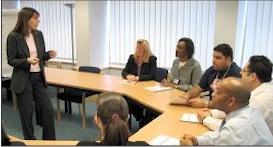There has been a lot of research done on exactly what motivates employees.
Although money can be a motivator if the work is mechanical, mindless and repetitive, for cognitive or creative work financial rewards can actually reduce performance!
What works is providing work that offers autonomy, mastery and purpose.
Here’s one of the best explanations or the research I’ve seen: Daniel Pink speaking on The Surprising Science of Motivation at TED:
It’s well worth the 18 minutes to watch if you have employees – live or virtual. Hope you enjoy it.

 There are numerous reasons why establishing a leadership mentoring program in your organisation may be one of the smartest things you can do, but here are seven good ones:
There are numerous reasons why establishing a leadership mentoring program in your organisation may be one of the smartest things you can do, but here are seven good ones: To follow from our recent article on
To follow from our recent article on  One of the first things we notice about good leaders is how many different yet effective types of leadership styles there are. While one of these leadership styles will be authentically right for you, and it might be very different to the leadership styles adopted by others in your organisation.
One of the first things we notice about good leaders is how many different yet effective types of leadership styles there are. While one of these leadership styles will be authentically right for you, and it might be very different to the leadership styles adopted by others in your organisation.





